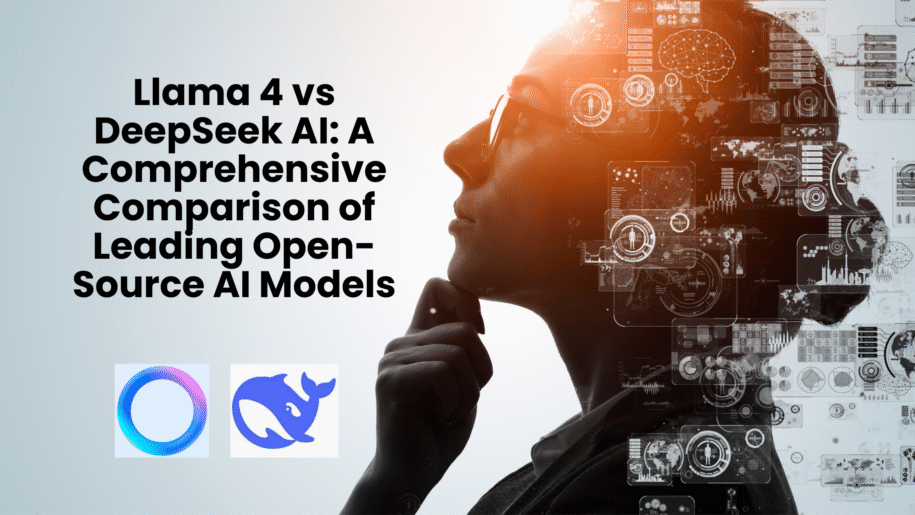Introduction – Llama 4 vs Deepseek
The open-source AI landscape is evolving rapidly, with new models challenging the status quo almost monthly. Among these, two models have recently captured significant attention from developers, researchers, and businesses alike: Meta’s Llama 4 and DeepSeek AI.
Both represent the cutting edge of publicly available AI technology, but they come with different strengths and ideal use cases. In this blog post, we’ll dive deep into what makes each model unique and help you determine which might be the better fit for your specific needs.
The Contenders
DeepSeek AI
Developed in China, DeepSeek AI has quickly emerged as a formidable player in the open-source AI space. The current version, DeepSeek V3.1, has garnered attention particularly for its performance in specialized knowledge domains and impressive multilingual capabilities.
What makes DeepSeek stand out is its specialized variants designed specifically for coding and research applications, making it a favorite among developers working on complex technical problems.
Llama 4
As Meta’s latest large language model, Llama 4 builds upon its predecessors with significant improvements in reasoning, safety features, and knowledge depth. Available in multiple sizes (including 8B and 70B parameter versions), it’s designed to support both research initiatives and commercial applications.
Llama 4 represents Meta’s continued commitment to advancing open-source AI while maintaining responsible development practices.
Head-to-Head Performance
When evaluating AI models, benchmark performance provides a quantitative way to compare capabilities. Here’s how these two models stack up across key benchmarks:
Benchmark | DeepSeek | Llama 4. | Advantage. |
MMLU (General Knowledge) | 78.2% | 82.5% | Llama 4 |
GSM8K (Math Reasoning) | 80.8% | 78.3% | DeepSeek |
HumanEval (Coding) | 74.6% | 67.2% | DeepSeek |
HELM (Overall) | 71.4% | 73.8% | Llama 4 |
These numbers tell an interesting story: while Llama 4 excels in general knowledge and overall performance (as measured by MMLU and HELM), DeepSeek demonstrates superior capabilities in mathematical reasoning and coding tasks.
Specialized Capabilities
Beyond raw benchmark scores, each model offers unique strengths that may make it more suitable for specific applications.
Where DeepSeek Shines
- Mathematical and Scientific Prowess: DeepSeek consistently outperforms on tasks requiring complex mathematical and scientific reasoning.
- Multilingual Support: Particularly impressive with Asian languages, DeepSeek offers robust support for users working in multilingual environments.
- Extended Context Window: With a massive 128K token context window, DeepSeek can process extremely long documents or conversations without losing track of earlier content.
- Specialized Coding Capabilities: DeepSeek Coder, a specialized variant, excels in programming tasks across multiple languages.
Where Llama 4 Excels
- General Knowledge: Llama 4 demonstrates stronger performance on benchmark tests measuring breadth of knowledge.
- Factual Accuracy: Users report fewer hallucinations and higher factual precision with Llama 4.
- Safety and Content Moderation: Meta has implemented robust safety measures in Llama 4, making it more suitable for consumer-facing applications.
- English-Language Optimization: For applications primarily serving English-speaking users, Llama 4 generally offers superior performance.
Programming & Technical Capabilities
For developers and technical teams, coding capabilities often rank high on the priority list when evaluating AI models.
DeepSeek Coder
DeepSeek’s specialized coding variant has generated significant buzz in developer communities, particularly for its:
- Top-tier performance on HumanEval and MBPP benchmarks
- Excellence in implementing complex algorithms
- Strong comprehension of Chinese-language codebase documentation
This specialized focus makes DeepSeek Coder particularly valuable for development teams working on algorithmically complex projects or in multilingual development environments.
Llama 4’s Coding Capabilities
While Llama 4 doesn’t offer a dedicated coding variant, it still demonstrates strong general coding capabilities:
- Solid performance across popular programming languages
- Excellent code explanation and debugging capabilities
- Strong integration with existing development workflows
This makes Llama 4 a versatile option for teams that need both coding support and other capabilities within a single model.
Making Your Choice: Decision Guidelines
Choosing between these models ultimately depends on your specific requirements. Here’s a simple decision framework to help guide your selection:
Consider DeepSeek AI if:
- Your applications require strong multilingual support, especially for Asian languages
- You’re working on projects involving complex mathematical or scientific reasoning
- You need specialized coding capabilities for algorithmic development
- Your use cases involve processing very long contexts (documents, conversations)
Consider Llama 4 if:
- General knowledge and factual accuracy are your top priorities
- You need robust safety features and content moderation
- You’re developing primarily for English-language applications
- You want to leverage Meta’s extensive ecosystem and support resources
The Hybrid Approach
It’s worth noting that many organizations are finding success with a hybrid approach, deploying both models for different use cases. This strategy allows teams to leverage the unique strengths of each model where they’re most beneficial.
For example, a company might use DeepSeek for its R&D department working on complex algorithmic problems, while deploying Llama 4 for customer-facing applications where safety and general knowledge are paramount.
Conclusion: An Exciting Time for Open-Source AI
Both DeepSeek AI and Llama 4 represent remarkable achievements in open-source AI development. The fact that these freely available models can compete with (and in some areas surpass) proprietary alternatives is a testament to the rapid democratization of AI technology.
As these models continue to evolve, we can expect to see the performance gap between open-source and closed-source solutions narrow even further. This competition not only drives innovation but also makes advanced AI capabilities accessible to a wider range of organizations and developers.
Whether you choose DeepSeek AI, Llama 4, or a combination of both, you’re tapping into some of the most capable AI technology available today. The right choice ultimately depends on aligning the strengths of each model with your specific needs and use cases.










